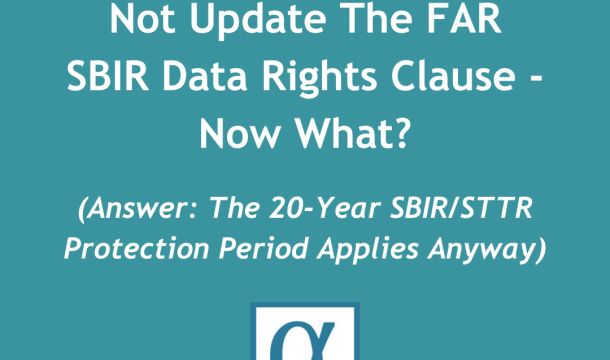The GovCon Bulletin™
SBA Seeks Comments on WOSB Certification Procedures
Today, the SBA issued an advanced notice of proposed rulemaking seeking input and comments on certification requirements for women-owned small businesses (WOSBs) and economically disadvantaged women-owned small businesses (EDWOSBs). As we wrote about here, last September, the SBA implemented congressional authority under the National Defense Authorization Act For Fiscal Year 2015 (NDAA) for sole-source awards to WOSBs or EDWOSBs. At that time, the SBA acknowledged that the NDAA created a requirement that a firm be certified as a WOSB or EDWOSB under one of four options: by a federal agency, by a state government, by the SBA, or by a national certifying entity approved by the SBA. Congress' omission of the then-existing option to self-certify to a contracting officer on a procurement-by-procurement basis was glaring.
In its final rule last September addressing WOSB sole-source authority, the SBA declined to address certification issues because implementation of the certification requirements is more complicated and to avoid delaying unnecessarily Congress’ sole source award authority. The SBA, nevertheless, insisted that sole-source authority could and should be immediately implemented “using existing program rules and procedures.” At the time of the final rule, those procedures included the process used by small businesses to certify their WOSB or EDWOSB status to contracting officers by submitting the following documents to the SBA's WOSB Program Repository: company formation and operation documents; copies of owner passports, birth certificates or naturalization documents; and a certificate by the owner certifying that company meets WOSB or EDWOSB eligibility requirements. Indeed, the SBA’s WOSB Compliance Guide, which describes the self-certification process, remained on its web site and as of this writing still remains on the SBA web site.
To be clear, when Congress removed the option for small businesses to "self-certify" eligibility status to a contracting officer, it added the option for small businesses to be certified by the SBA itself. In doing so, Congress gave no instructions on what the SBA's certification requirements should be or how the SBA should implement its certification procedures, thus leaving those decisions to the SBA's discretion. The SBA’s decision to continue to use the existing repository and to use the existing self-certification procedure was not without authority, therefore. In any event, in its request for comments today, the SBA has now taken a more definitive step toward implementing new procedures and has signaled that existing procedures will not be used in the future. Indeed, among the options it is considering is “whether there should be a grace period after implementation to give firms that have self-certified the time necessary to complete the certification process.” As to the four certification options, the SBA asks responses to the following questions:
Third Party Certification
1. How many third party certifiers would be needed?
2. Should the SBA add more information about the procedures and processes used by third party certifiers?
3. Should the SBA regulations contain information on how to become an approved third party certifier?
4. What type of notice should be required to identify third party certifiers?
5. Should cost to EDWOSB and WOSBs be part of the criteria that the SBA considers when deciding whether to approve one or more additional third party certifiers? If so, what if any methodology should the SBA utilize when considering cost?
6. Should the SBA consider the ongoing cost of recertification when evaluating third party certifiers?
7. Should the SBA determine the term period a third-party certification is valid? If so, what should it be?
8. Should the SBA authorize a third-party limited access to an applicant’s repository file?
9. Should the SBA change its current processes regarding denials by third party certifiers?
10. In the future, should the SBA consider allowing third party certifiers to approve mentor-prote´ge´ agreements and joint venture agreements involving EDWOSB and WOSB participants?
Certification By States and Federal Agencies
Currently, the SBA's regulations recognize WOSB certifications made by States that have certified firms that are owned and controlled by women to be DBEs for the DOT’s DBE program. The regulations do not, however, recognize any other State certifications and do not authorize other Federal agencies to certify WOSBs and EDWOSBs.
1. Should the authority to certify WOSBs and EDWOSBs be extended to States generally? If the authority should be extended, how should the SBA authorize individual States to participate as WOSB and EDWOSB certifying entities (i.e., what sort of approval process should be implemented to ensure that the SBA’s WOSB and EDWOSB requirements are properly applied)?
2. Should the SBA accept DBE certifications for women-owned firms as conclusive of WOSB ownership and control status or should the SBA look further at one or more specific eligibility requirement(s)?
3. What other State entities might have sufficient expertise to make WOSB and EDWOSB certifications?
4. Should the SBA consider other Federal agencies as entities that can certify WOSBs and EDWOSBs? If so, how should that occur? Should an agency be able to certify a WOSB or EDWOSB only for purposes of a specific WOSB or EDWOSB contract with that agency? Which office within those agencies should bear the responsibility for this certification authority?
5. Should there be a protest mechanism that would allow an interested party to protest the WOSB or EDWOSB status of a firm certified by a State or other Federal agency to the SBA?
SBA's Certification Program
1. Should the SBA limit its WOSB and EDWOSB certifications only to those made through the 8(a) BD program, as is currently authorized in the SBA’s regulations?
2. Should the SBA’s regulations be clarified to specify how a women-owned firm applying to the 8(a) BD program can simultaneously receive certification as a WOSB and EDWOSB?
3. Should the SBA create a new certification program specific to WOSBs and EDWOSBs? If so, how should the SBA structure such a certification program so that the limited resources do not cause the time period for certification to be overly lengthy? How should the SBA handle the likelihood of a large number of firms seeking certification once the certification process is operational? Should the SBA consider or attempt to establish an online WOSB/EDWOSB certification program, with dynamic feedback during the certification process?
4. What, if any, documents should the SBA collect when certifying a firm as a WOSB or EDWOSB? Are the current repository document requirements unnecessary or significantly burdensome and if so, why?
5. Should the SBA and third-party certifiers utilize the same processes for certifying concerns as EDWOSBs and WOSBs?
6. How long should the ED/WOSB certification process take? How would this compare with the current amount of time required for self-certification?
7. Should firms that the SBA finds ineligible during the application process have the right to a request for reconsideration or an appeal of that decision? If an appeal, should it be to SBA’s Office of Hearings and Appeals (OHA)? Currently, firms denied certification for the 8(a) BD program may appeal to OHA.
8. How long should a certification be valid? Currently the System for Award Management (SAM) requires users to update and verify their information annually. Should firms certified by SBA as EDWOSBs or WOSBs be required to update their certifications manually?
9. Should firms need to be recertified annually? If not annually, how long should WOSB or EDWOSB certification last? How should a firm be re-certified as a WOSB or EDWOSB once the time period for certification expires: should it have to re-apply anew, or should it be able to submit only those items to the SBA for review that have changed since its initial certification? Should there be an online process that facilitates application or re-certification? If no changes have occurred, should the firm be able to submit an affidavit or declaration to that effect and be automatically re-certified?
10. If a firm was previously certified by a third-party certifier, should it be able to apply to the SBA for certification (or re-certification), or should it be permitted to apply only to the entity that originally certified it?
Comments are due February 16, 2016.



